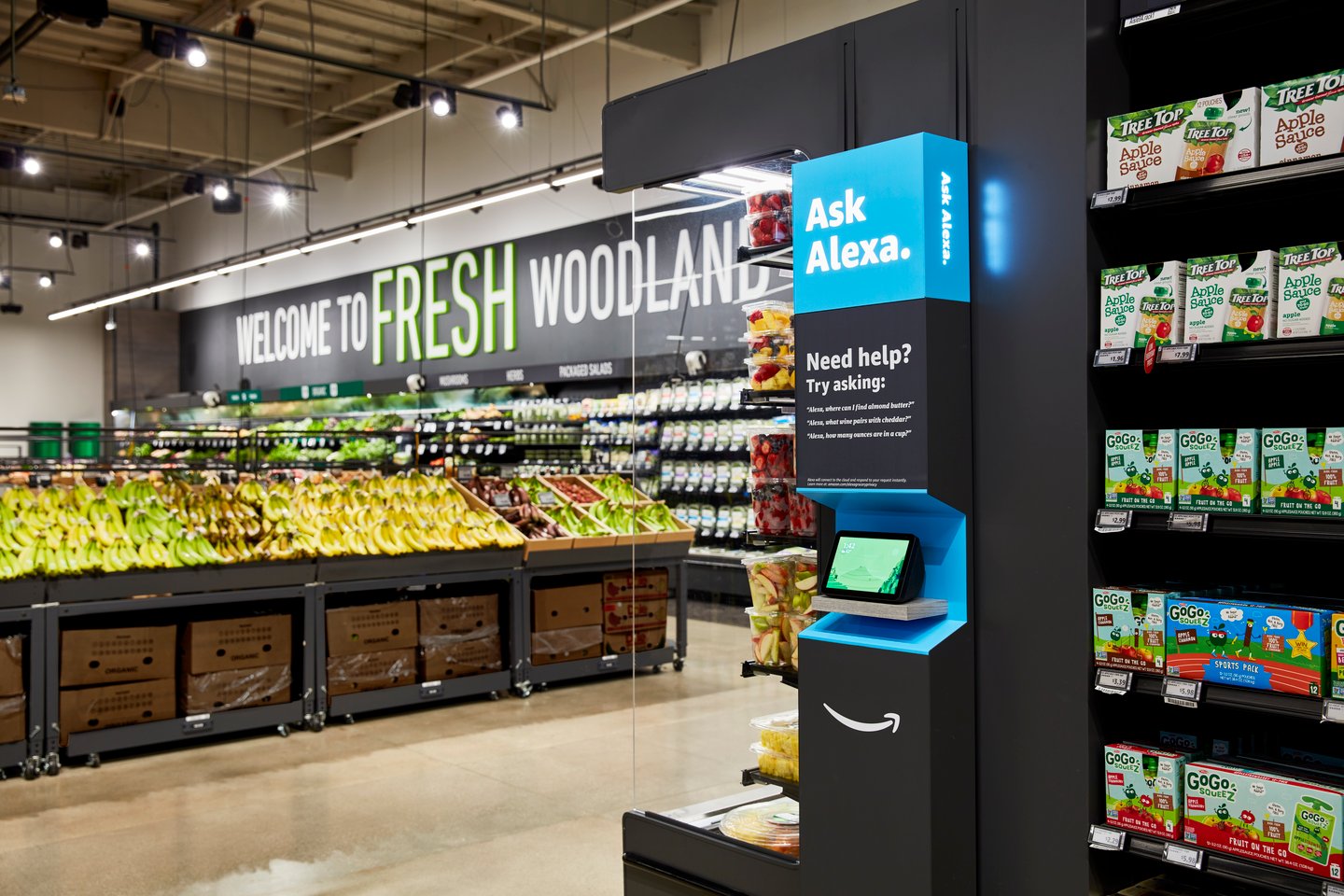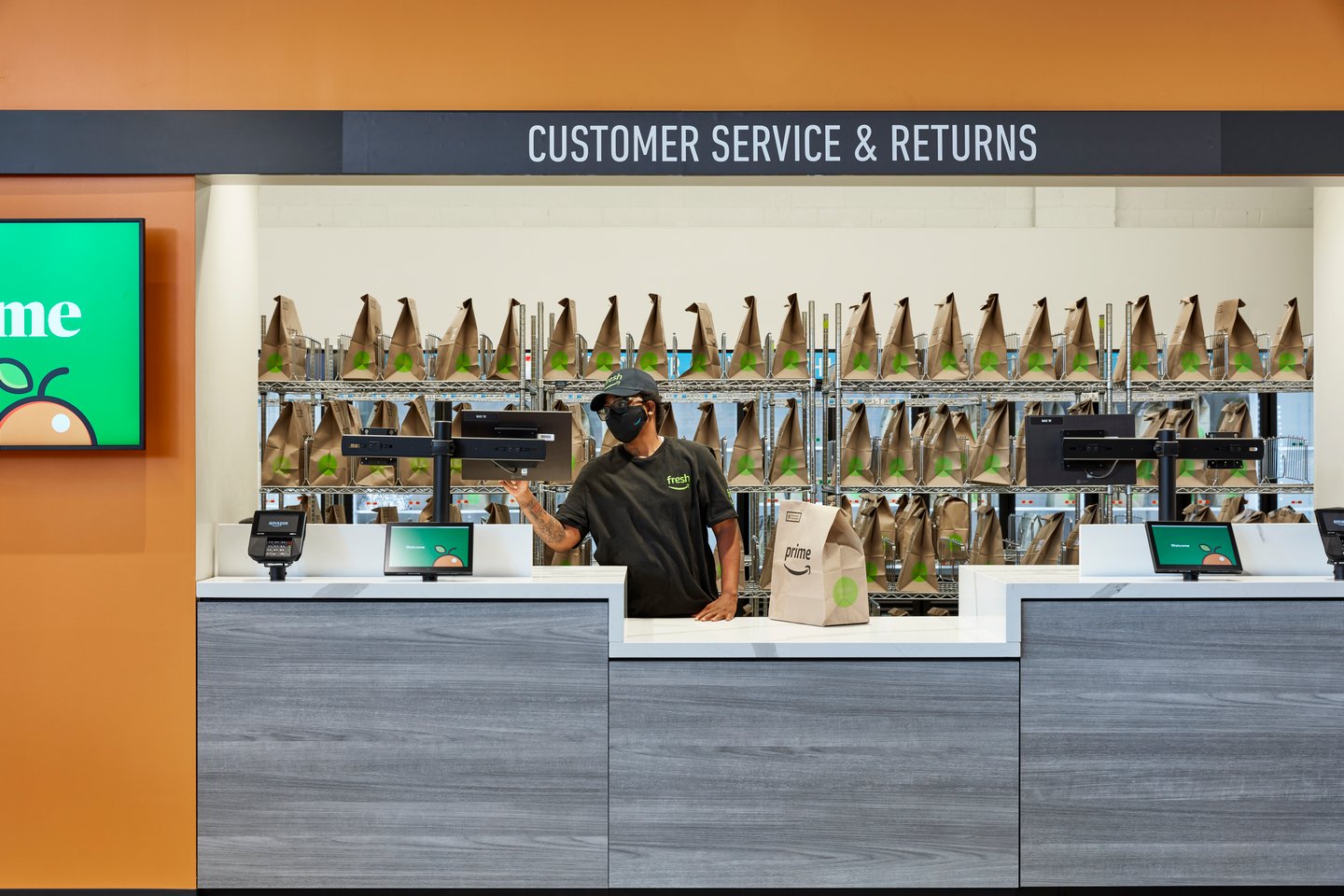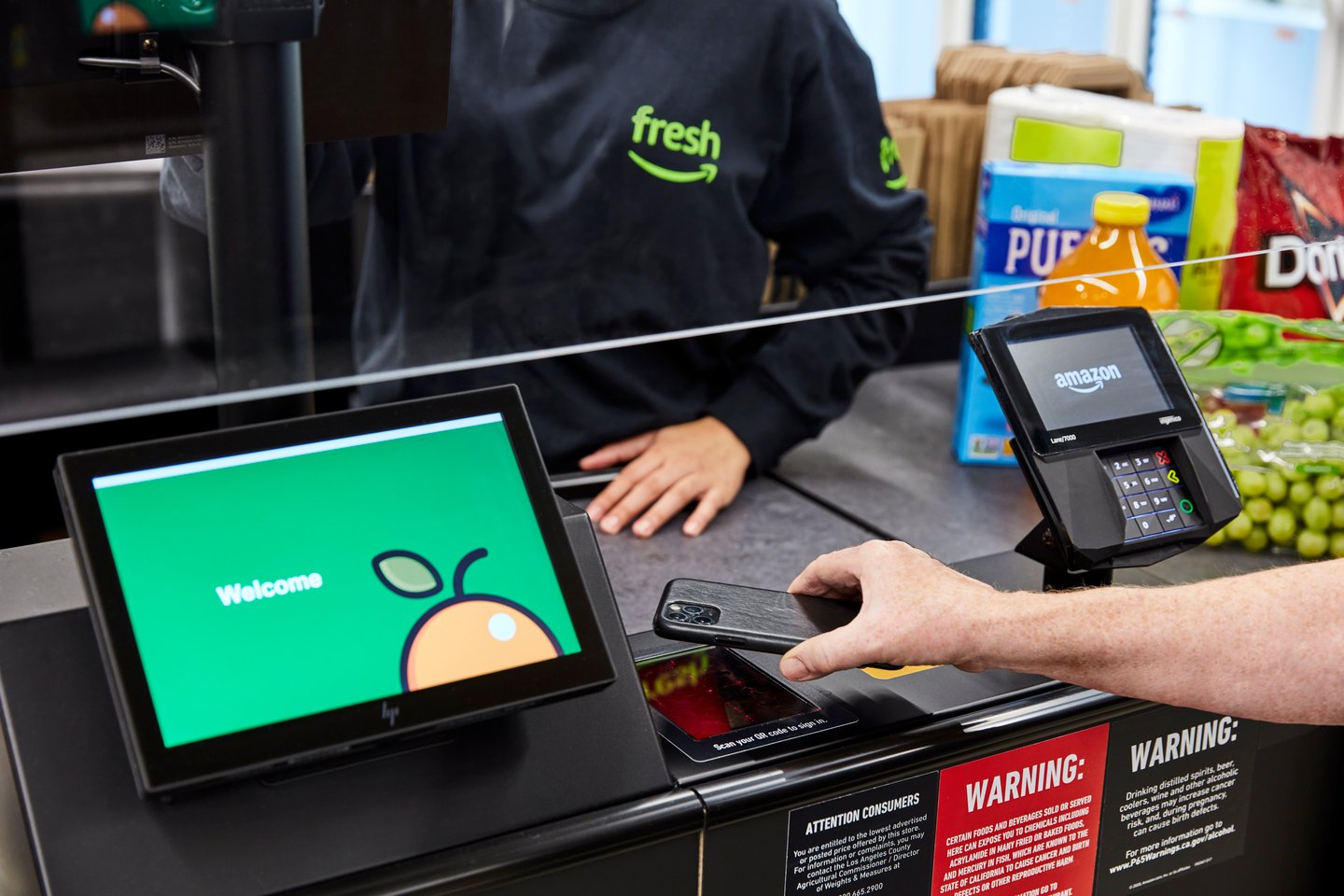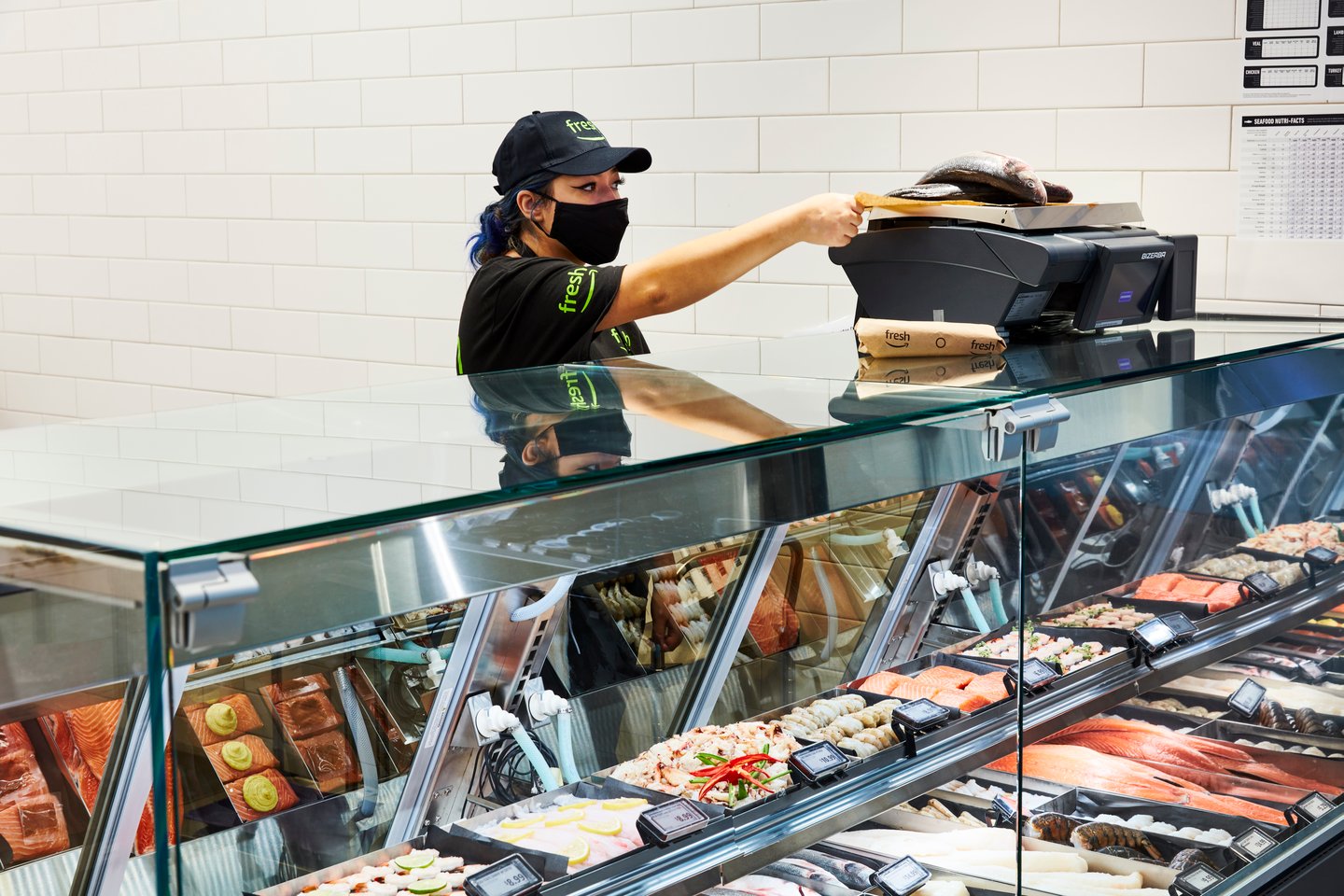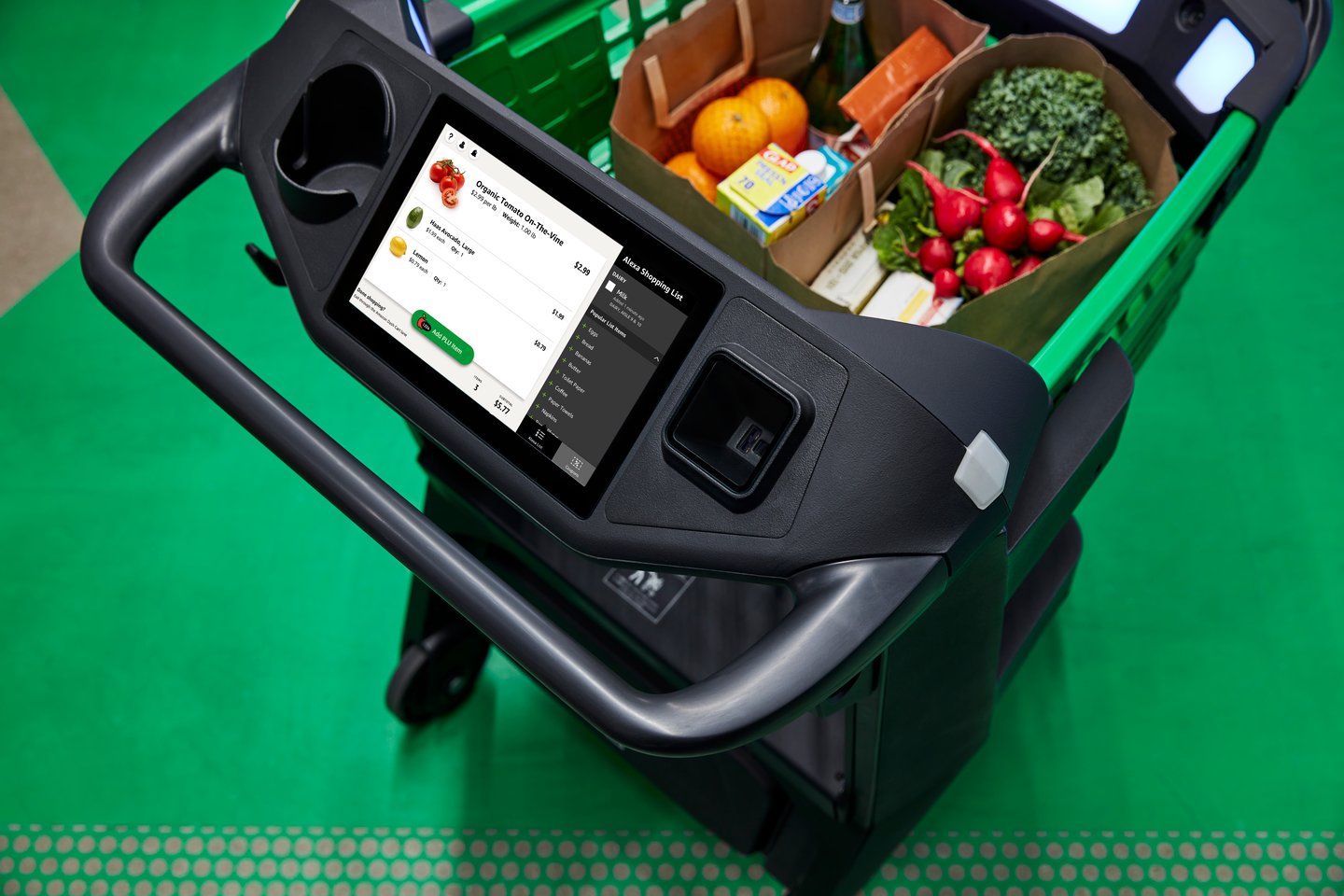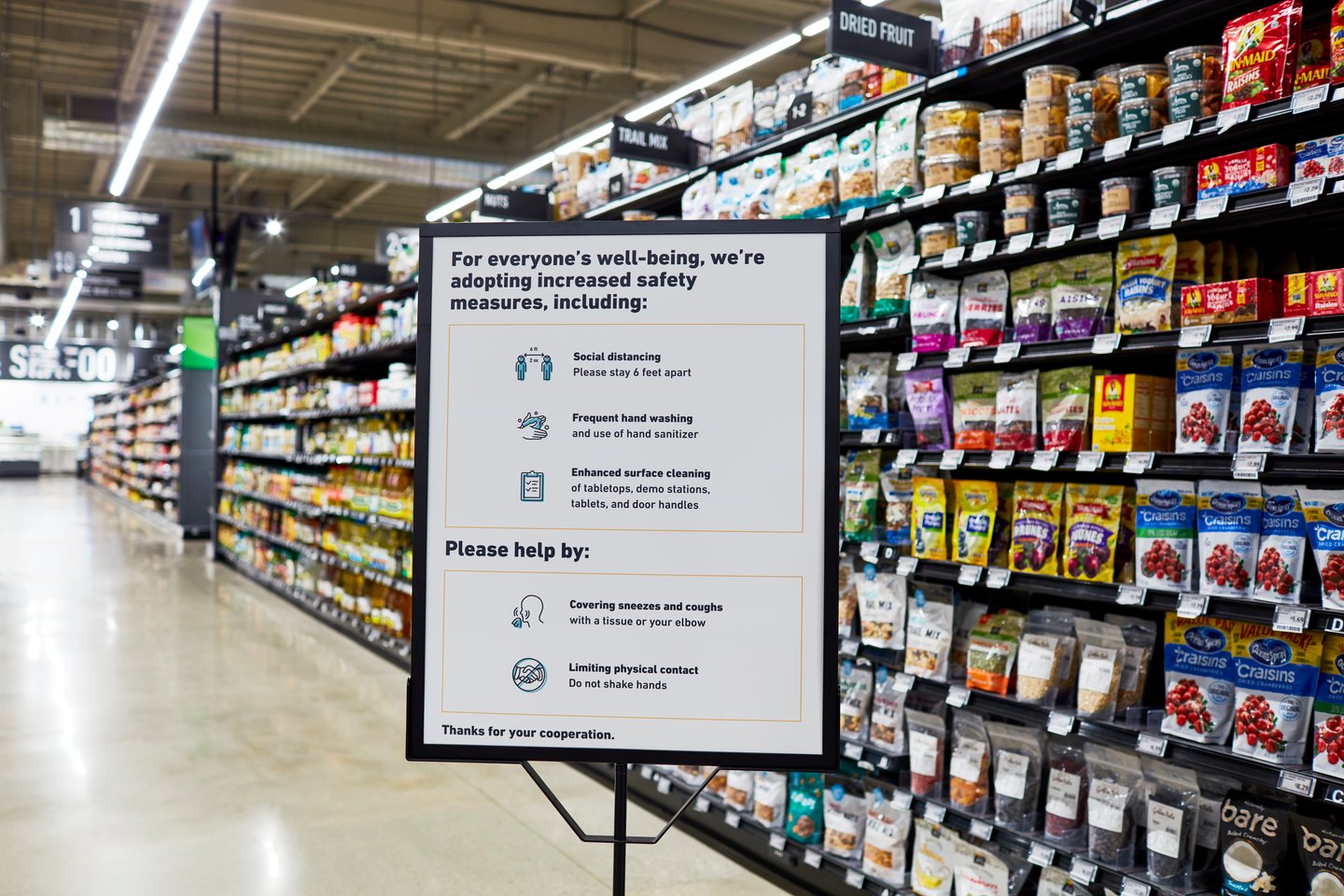EXCLUSIVE: Inside Amazon's New Fresh Grocery Banner
Three years after it acquired Whole Foods Market, Amazon is planning to disrupt the grocery industry once again, this time with innovation not seen in any traditional food retailer -- ever.
After months of speculation, the Seattle-based company today has opened its first stand-alone supermarket banner: a 35,000-square-foot, digitally perfected store in Woodland Hills, California, called Fresh.
The Fresh banner is not an offshoot of Whole Foods, nor does it look like one of those checkout-less Amazon Go stores that have been popping up in urban areas across the United States, nor does it look like the 365 banner that Amazon scrapped last year either.
The new Amazon Fresh supermarket takes elements of all of those concepts -- micro-fulfillment, contactless features, a curated assortment of premium and conventional products, and highly personalized service -- and melds them into one innovative store that offers something for every type of food shopper, from low-touch cashierless checkout to high-touch made-to-order prepared foods. This is a store that is designed to appeal to a shopper looking for the best of everything: the best product mix, the best technology and the best shopping experience.
"The Amazon Fresh grocery store is designed from the ground up to offer a seamless grocery shopping experience, whether customers are shopping in-store or online," said Jeff Helbling, VP of Amazon Fresh stores. "We’ve taken our decades of operations experience to deliver consistently low prices for all, and free same-day delivery for Prime members."
Amazon told Progressive Grocer that the Fresh store opens today to a select group of invited customers in Woodland Hills, part of the Los Angeles metro area, who can shop the store before it opens widely to the public in the coming weeks; an exact date will be announced later. Store hours for the new Fresh will be from 7 a.m. to 10 p.m. every day.
In an exclusive interview, Helbling, who has held several high-level roles at Amazon, said that the company has been operating the location as a dark store and is now ready to introduce Amazon's representation of the perfect grocery store to the world.
"We've had hundreds of associates providing online grocery delivery out of the store over the past two months," Helbling noted. "I'm very proud and humbled by the work they've done to serve the community during this tough period. And we're all collectively excited to open our doors and begin expanding our service to the Woodland Hills community."
Of course, the new Fresh store will have pandemic safety measures in place for the foreseeable future. Helbling said that the company has taken learnings from Whole Foods and applied the same safety measures in Amazon Fresh stores: requiring daily temperature checks for all employees, requiring face coverings for all employees and customers entering the store, offering free disposable masks for any customer who wants one, and operating the store at 50% capacity.
ASSORTMENT
Consumers shopping Amazon Fresh will find a wide assortment of national brands and high-quality produce, meat and seafood, the company said. Although Helbling declined to offer SKU specifics, he did say that the assortment will consist of "all the items you'd expect to see in a full-service grocery store," including national, private and local brands. So shoppers will be able to find natural products such as those found at Whole Foods, conventional and local products such as those found at traditional grocers, and private brands from all of Amazon's banners, including Amazon and Whole Foods.
Specifically, the company is launching at least two new exclusive private label brands at Fresh stores: Fresh and Cursive.
"Our Fresh brand offers great value on things like meat, seafood and bakery items. For example, we will offer our Fresh brand, natural whole chicken with no added hormones, for 99 cents," Helbling said. "And our new Cursive brand is an exclusive wine brand to Amazon. It offers a selection of reds and whites, also with terrific value. My favorite of this group is our Cursive Rose', which is great for this time of year, and was also recently awarded a 92 rating by James Suckling."
Amazon Fresh will additionally offer locally produced and regional products curated to each store.
"So, at the Woodland Hills Fresh store, we will have Groundworks coffee and RokenWagner bakery products," Helbling said. "And we will offer a selection of regional favorites not typically found in L.A., such as Duke's Mayonnaise, which is from South Carolina, and Ellenos yogurt, from Seattle."
An in-house culinary team will offer a range of prepared foods made fresh in-store every day, from fresh-baked bread and made-to-order pizzas, to rotisserie chickens and hot sandwiches. Full-service meat and seafood departments join a massive produce department carrying many Whole Foods branded organics. A full-service deli department is offered, as are hot and cold food bars.
TECHNOLOGY
The store is not 100% checkout-less, another nod from Amazon as it looks to give its customers as many choices as possible. The Fresh concept offers traditional checkout carts, traditional checkout lanes and traditional point of sale (using cash, credit, SNAP etc). But the new Fresh store will also feature new ways to make grocery shopping more convenient, including the Amazon Dash Cart, which enables customers to skip the checkout line, and new Alexa features to help customers manage their shopping lists and better navigate aisles. The Fresh stores feature Ask Alexa stations throughout the store to help shoppers find that organic steel-cut oatmeal.
Customers using the Dash Cart simply place their bags in the cart, sign in using their Fresh QR code in the Amazon app, shop and exit through the Dash Cart lane to automatically complete their payment. The cart uses a combination of computer vision algorithms and sensor fusion to identify items put in the cart.
"We're excited for customers to try it out," Helbling said of the Dash cart. "I've used it as a beta tester now for a while, and I use it when I do my in-store shopping at Woodland Hills, and I love it. I find it super-convenient. You just sign in using the Amazon app, you shop at the store, you walk out through the Dash cart lane, and that's it. You skipped the checkout line."
The store will also be offering same-day delivery and pickup. Customers can pick up their orders by visiting an in-store customer service counter or by pulling up to a dedicated pickup parking spot. Helbling seemed to indicate that Amazon believes the American consumer wants to shop for groceries online and have both in-store pickup and delivery as fulfillment options.
"We are doing both," he said. "Prime members get both for free, and the store will have a bunch of dedicated spots immediately out front of the store for curbside pickup as well."
Amazon Fresh stores will also offer Amazon.com package pickup and free package-less product returns.
LOW PRICES
Helbling stressed that this relentless focus on customer wants and needs, satisfied in a seamless way, won't come at a steep price for shoppers.
"We’ve taken our decades of operations experience to deliver consistently low prices for all," he asserted. "When customers visit the store, they can shop low prices across a range of national brands, quality produce, meat and seafood. For example, a 3-pound bag of onions for $1.69, and a 10-count box of Quaker Oatmeal (all flavors) for $2.50."
Additionally, customers will earn 5% back at Amazon Fresh when they use their Amazon Prime Rewards Visa Signature Card or Amazon Prime Store Card at checkout.
EXPANSION
According to Helbling, the company will open additional Fresh stores in the Los Angeles and Chicago regions. Many more are sure to come.
"We're currently operating online grocery delivery from Woodland Hills, Irvine and Northridge," Helbling said. "We've also announced that we're going to open a Fresh store in North Hollywood shortly. And in Chicago, we're operating online grocery delivery out of our Naperville store, and we've announced that we're going to open in Oak Lawn and Schaumburg."
The opening of Amazon's new Fresh concept comes a month after the company reported sales that surpassed all estimates for the second quarter, proving that shoppers continued to turn to the online giant during the COVID-19 pandemic. Amazon's net sales increased 40% to $88.9 billion in the second quarter, compared with $63.4 billion in the second quarter of 2019.
Grocery sales were also a bright spot during this time period. Amazon increased grocery delivery capacity by more than 160% and tripled grocery pickup locations to support customers not wanting to shop in stores during COVID-19. The result was that grocery sales tripled in the second quarter when compared with the same period last year.
Amazon's physical-store sales, however, were down 13% to $3.774 billion, compared with $4.330 billion in the second quarter of 2019. A portion of the decline may be attributed to how Amazon reports physical-store sales. Unlike other retailers, Amazon's physical store sales reflect only those sales where customers physically select items in a store. Orders placed online with Whole Foods Market, either for curbside pickup or delivery, are classified as online sales. The approach is the opposite of how retailers such as Kroger, Walmart or Albertsons account for digital sales, and tends to obscure the true performance of Whole Foods, especially as more shoppers choose digital methods of fulfillment.
As for why Amazon is opening a physical store when so much of the demand for groceries is shifting online, Helbling said the short answer was to give to give customers the choice.
"You know, we find certainly that online shopping, as you well know, is up during the pandemic," he continued, "but a lot of customers still prefer to shop either all the time or a lot of the time in a physical grocery store. And so we're investing in online, and we're investing in a store. This store is sort of a manifestation of this. And so that's why we're doing it. We want to give customers choices."
No. 2 on The PG 100, Progressive Grocer’s 2020 list of the top food and consumables retailers in North America, Amazon is also planning grocery stores in the Los Angeles and Philadelphia markets, according to media reports. Austin, Texas-based Whole Foods is No. 24 on the list.
For a detailed look inside the Woodland Hills Fresh store, see below.




